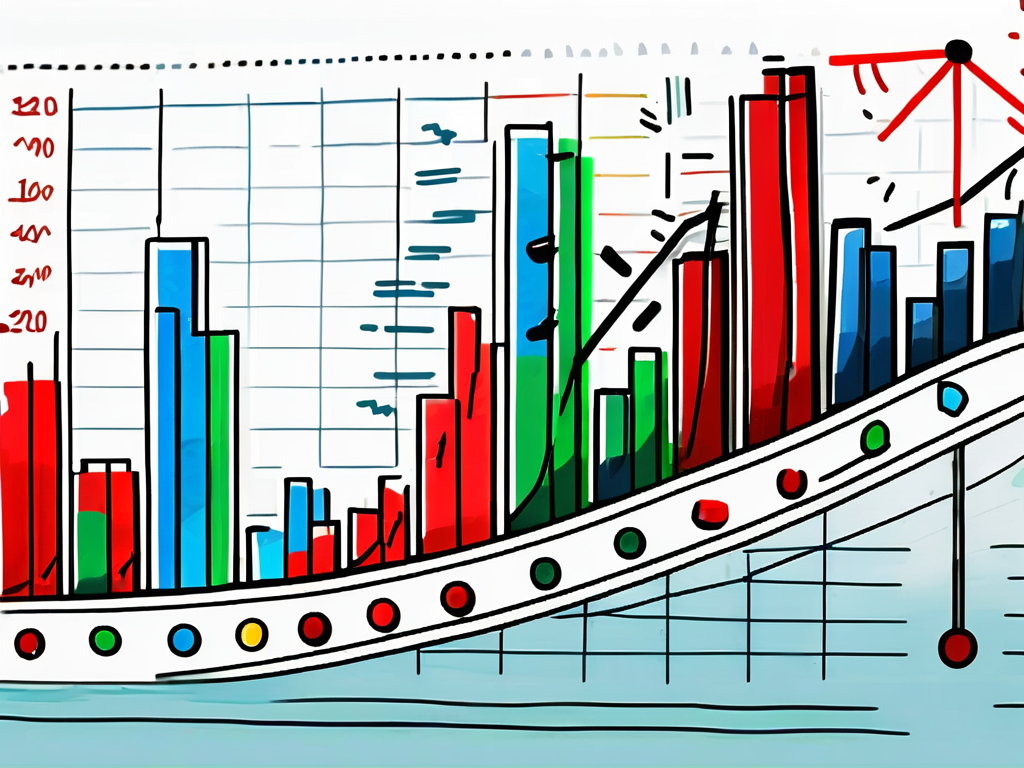How Stocks React To News Events
Investing in the stock market can be an exciting but volatile experience. The market is constantly influenced by a variety of factors, including news events. Understanding how stocks react to news events is key to making informed investment decisions. In this article, we will explore the role of social media in shaping stock market responses, the importance of timing when reacting to news events, strategies for navigating news-driven volatility, and the effect of geopolitical events on market stability.The Role of Social Media in Shaping Stock Market Responses
Social media platforms have become powerful communication channels that can significantly impact stock market movements. With the ability to disseminate news quickly and reach millions of users, social media has the potential to shape market sentiment. For example, a tweet from a prominent figure or a post on a popular forum can cause a surge or decline in stock prices. Investors closely monitor social media platforms for breaking news and market rumors that could affect their investments. However, it is crucial to exercise caution when relying on social media for stock market information. Not all sources are credible, and misinformation spreads quickly. It is essential to verify information from reputable sources before making any investment decisions.
One interesting aspect of social media’s influence on the stock market is the rise of social trading platforms. These platforms allow users to follow and replicate the trades of successful investors or traders. By leveraging the collective wisdom of a large community, social trading platforms aim to democratize investing and provide access to strategies that were once exclusive to professional traders.
Moreover, social media sentiment analysis has become a popular tool for investors to gauge market sentiment. By analyzing the overall sentiment of social media posts related to specific stocks or sectors, investors can gain insights into market trends and potential price movements. This data-driven approach complements traditional market analysis and provides a real-time pulse of investor sentiment.
However, it is crucial to exercise caution when relying on social media for stock market information. Not all sources are credible, and misinformation spreads quickly. It is essential to verify information from reputable sources before making any investment decisions.
One interesting aspect of social media’s influence on the stock market is the rise of social trading platforms. These platforms allow users to follow and replicate the trades of successful investors or traders. By leveraging the collective wisdom of a large community, social trading platforms aim to democratize investing and provide access to strategies that were once exclusive to professional traders.
Moreover, social media sentiment analysis has become a popular tool for investors to gauge market sentiment. By analyzing the overall sentiment of social media posts related to specific stocks or sectors, investors can gain insights into market trends and potential price movements. This data-driven approach complements traditional market analysis and provides a real-time pulse of investor sentiment.
The Importance of Timing: When to React to News Events
Timing is critical when reacting to news events in the stock market. Investors often face the dilemma of when to act upon new information. Reacting too quickly can lead to impulsive decisions that may result in losses, while reacting too late may cause missed opportunities. It is advisable for investors to assess the credibility and impact of news events before taking any action. This involves conducting thorough research, consulting trusted advisors, and considering the long-term implications. Developing a solid understanding of a company’s fundamentals and market trends can help investors make more informed decisions.
Furthermore, it is essential for investors to stay updated on global economic indicators and geopolitical events that could potentially influence the market. Factors such as interest rate changes, inflation rates, and political instability can have a significant impact on stock prices. By staying informed about these external factors, investors can better anticipate market movements and adjust their strategies accordingly.
Moreover, seasoned investors often emphasize the importance of maintaining a diversified portfolio to mitigate risks associated with market volatility. Diversification involves spreading investments across different asset classes, industries, and geographic regions. This strategy can help protect investors from significant losses in case of a downturn in a particular sector or market.
It is advisable for investors to assess the credibility and impact of news events before taking any action. This involves conducting thorough research, consulting trusted advisors, and considering the long-term implications. Developing a solid understanding of a company’s fundamentals and market trends can help investors make more informed decisions.
Furthermore, it is essential for investors to stay updated on global economic indicators and geopolitical events that could potentially influence the market. Factors such as interest rate changes, inflation rates, and political instability can have a significant impact on stock prices. By staying informed about these external factors, investors can better anticipate market movements and adjust their strategies accordingly.
Moreover, seasoned investors often emphasize the importance of maintaining a diversified portfolio to mitigate risks associated with market volatility. Diversification involves spreading investments across different asset classes, industries, and geographic regions. This strategy can help protect investors from significant losses in case of a downturn in a particular sector or market.
Strategies for Investors: Navigating News-Driven Volatility
News-driven volatility can create both risks and opportunities for investors. While sudden market fluctuations can be unsettling, they also present chances to capitalize on undervalued stocks. Here are some strategies investors can consider when navigating news-driven volatility: News-driven volatility in the financial markets is a common occurrence, often triggered by events such as economic data releases, geopolitical tensions, or corporate earnings reports. These fluctuations can test investors’ emotional resilience and decision-making abilities. However, seasoned investors understand that volatility is a natural part of market dynamics and can be managed effectively with the right strategies.
News-driven volatility in the financial markets is a common occurrence, often triggered by events such as economic data releases, geopolitical tensions, or corporate earnings reports. These fluctuations can test investors’ emotional resilience and decision-making abilities. However, seasoned investors understand that volatility is a natural part of market dynamics and can be managed effectively with the right strategies.
- Stay Calm and Analyze: During periods of volatility, it is essential to remain calm and analyze the situation objectively. Emotions often lead to rash decisions that can harm investment portfolios. Take time to evaluate the impact of the news event on the market as a whole, as well as on individual stocks.
- Focus on Fundamentals: Despite market volatility, it is crucial to focus on a company’s fundamentals. Strong financials, a competitive edge, and a solid business model can indicate resilience in the face of short-term disruptions.
- Diversify Your Portfolio: Diversification is a well-known strategy to mitigate risks. By spreading investments across various sectors and asset classes, investors can minimize the impact of negative news events on their overall portfolio.
- Consider a Long-Term Perspective: While news events can create short-term market fluctuations, their long-term impact may be less significant. Investors with a long-term perspective may choose to ride out the volatility and focus on the underlying fundamentals.
The Effect of Geopolitical Events on Market Stability
Geopolitical events, such as political unrest, trade disputes, or natural disasters, can significantly impact market stability. These events create uncertainty, which tends to increase market volatility. Investors closely monitor geopolitical developments to understand their potential effects on various sectors and industries. It is worth noting that geopolitical events do not always have a negative impact on the market. In some instances, they can create opportunities for growth. For example, an easing of political tensions or the resolution of a trade dispute can lead to increased investor confidence and market rally. Despite the potential impact of geopolitical events, it is important for investors to avoid making knee-jerk reactions. Instead, conducting thorough research, diversifying portfolios, and staying informed can help investors navigate market turbulence. When it comes to political unrest, it is crucial to analyze the specific factors at play. For instance, a peaceful protest advocating for social justice may have a different impact on the market compared to a violent uprising. Understanding the underlying causes and potential outcomes of geopolitical events can provide valuable insights for investors. Trade disputes between major economies can also have far-reaching consequences. Tariffs and trade barriers can disrupt supply chains, impacting the profitability of businesses and the overall health of the economy. Investors need to closely monitor trade negotiations and assess the potential implications for specific industries and companies. Natural disasters, such as hurricanes, earthquakes, or wildfires, can have both immediate and long-term effects on the market. In the short term, these events can disrupt production, leading to supply chain disruptions and increased costs. However, in the long term, they can also create opportunities for growth as reconstruction efforts stimulate economic activity. In conclusion, understanding how stocks react to news events is vital for investors. Social media plays a significant role in shaping market responses, and timing is crucial when reacting to news. Investors need to develop strategies to navigate news-driven volatility and be aware of the impact of geopolitical events on market stability. Remember, this article is for educational purposes only and is not intended to provide financial advice. If you are interested in exploring stock market opportunities, consider reaching out to TrendCloud Trading for more information.Enhance Your Trading Strategy with TrendCloud
As you’ve learned, staying ahead in the stock market means understanding the nuances of how stocks react to news events and geopolitical developments. If you’re ready to take your trading to the next level, Chris Juliano’s TrendCloud Trading System offers the advanced tools and insights you need. Embrace the power of Momentum and trend analysis across multiple timeframes, and join a community of traders who are harnessing the TrendCloud Trading System to refine their strategies, whether in swing trading, day trading, or long-term investing. Don’t let market volatility dictate your success. Learn More about how the TrendCloud Trading System can empower your trading decisions.
